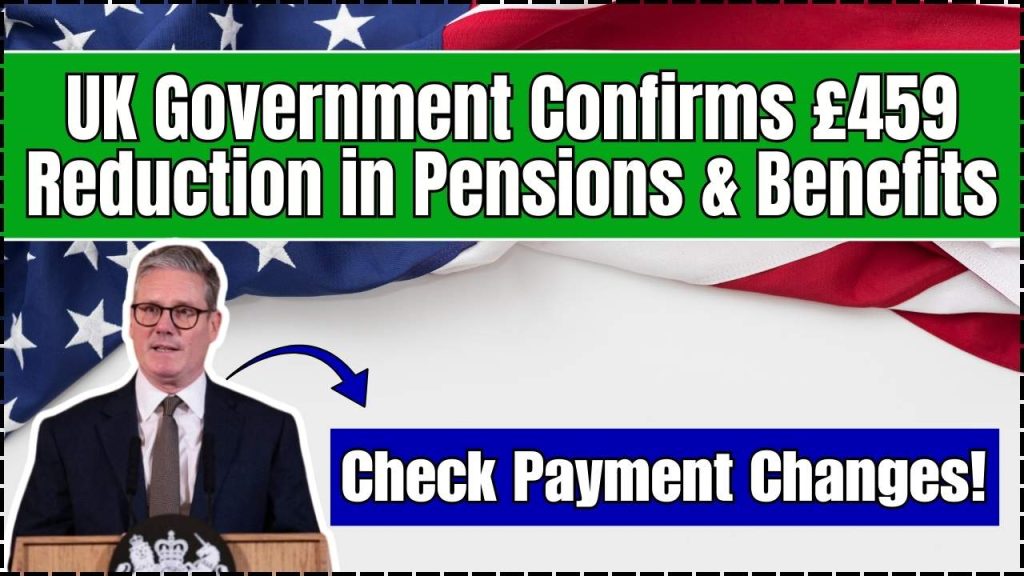£459 Reduction in Pensions & Benefits: The UK Government has confirmed a £459 reduction in pensions and benefits, affecting millions of older people, disabled individuals, and working families. These changes are part of a broader welfare reform aimed at curbing public spending, reshaping how support is delivered, and encouraging workforce participation.

If you’re unsure how this will affect your household, you’re not alone. In this complete guide, we explain what’s changing, who’s impacted, and most importantly — how to respond with practical advice and official resources.
£459 Reduction in Pensions & Benefits
| Category | Details |
|---|---|
| Total Average Cut | £459 annually per household (estimated) |
| Changes Start | From Spring 2025 onwards, with rollout into 2026 |
| Winter Fuel Payment | Up to £300 cut due to new income-based eligibility rules |
| PIP Adjustments | More frequent reassessments and stricter criteria |
| Universal Credit | Changes to taper rates and work allowances |
| Affected Groups | Pensioners, disabled individuals, low-income families |
| Households Impacted | Over 1.2 million pensioners & 500,000+ disabled recipients (est. by Age UK) |
| Official Resources | Gov.uk – Benefits Overview |
| Action Deadline | Appeals and adjustments begin from May 2025 |
The confirmed £459 average cut to pensions and benefits may feel like another blow during a cost-of-living crisis. But there are ways to adapt, challenge decisions, and access support.
Don’t ignore letters from DWP — respond quickly, gather evidence, and seek advice. While the changes may be policy-driven, your response can be personal, proactive, and empowered.
Why Are Pensions and Benefits Being Reduced?
The government has cited sustainability and economic responsibility as key reasons for the reductions. According to the Office for Budget Responsibility (OBR), disability benefit spending alone is set to double from £22 billion to £44 billion by 2028 if no action is taken.
“We are committed to helping people who need support, but we must also ensure the system is sustainable,” a DWP spokesperson told The Guardian. “These changes are not cuts for their own sake, but to refocus resources where they’re most needed.”
Still, advocacy groups like Age UK and Citizens Advice warn the reforms could push over 100,000 people into poverty, particularly those with fixed incomes or health conditions.
What’s Changing in 2025?
1. Winter Fuel Payment Cut – Up to £300 Removed
The Winter Fuel Payment has long provided extra funds to pensioners to help with heating bills. Now, it’s being means-tested for the first time.
- Before: Automatically given to most over-65s, worth £250–£300 per winter.
- Now: Only available to those on low or no income beyond the State Pension.
- Result: Up to £300 lost per year for middle-to-high-income pensioners.
Tip: If you receive Pension Credit, you will likely still qualify. Check the Winter Fuel Payment page for details.
2. PIP (Disability Benefits) Tightening
Changes to Personal Independence Payment (PIP) include:
- Tighter eligibility criteria
- Medical reassessments every 1–3 years (based on condition)
- A push to reconsider long-term awards
The government aims to save £5–£7 billion by 2030. But critics say it disproportionately affects people with “invisible illnesses” like ME, fibromyalgia, and mental health conditions.
Case Example:
“Since I was reassessed, I lost my mobility support even though my condition hasn’t improved,” says Rachel, 42, from Leeds, who lives with rheumatoid arthritis.
3. Universal Credit Changes
Universal Credit recipients will see:
- Taper rate adjustments: Workers keep less of their earnings as benefits are withdrawn quicker.
- Work allowance thresholds reduced: Many part-time workers will lose additional support.
Impact: Families with working-age parents, carers, or disabled members could see monthly income fall by £50–£100 depending on their hours worked and rent costs.
Who Will Be Affected?
These cuts could affect:
- 1.2 million pensioners (via Winter Fuel Payment)
- Over 500,000 PIP recipients
- Roughly 2 million Universal Credit households
According to Citizens Advice, 60% of PIP appeals are successful, indicating a system that may already be failing to correctly assess needs.
How to Prepare for the Benefit Cuts
Step 1: Check Your Entitlement
Use a benefits calculator to see if you’re losing out on help you do qualify for:
- EntitledTo Calculator
- Turn2Us Benefits Checker
Step 2: Appeal or Challenge Decisions
You can:
- Request a Mandatory Reconsideration
- Submit medical or financial evidence
- Appeal to an independent tribunal
Step 3: Apply for Alternative Support
Even if you lose one benefit, you may be eligible for:
- Pension Credit
- Council Tax Reduction
- Carer’s Allowance
- Attendance Allowance
Step 4: Apply for Energy Support
If Winter Fuel Payment is cut:
- Ask your council about emergency winter grants
- Apply for the Warm Home Discount
- Visit MoneySavingExpert Energy Grants Guide
When Will These Changes Happen?
| Date | Action |
|---|---|
| April 2025 | Final Winter Fuel Payment under old rules |
| May–August 2025 | PIP reassessments begin |
| September 2025 | Universal Credit taper & threshold changes |
| By 2026 | Full rollout of all reforms |
Major PIP Overhaul Coming: DWP Plans Reform Within 2 Years – Key Details Inside!
2025 DWP Benefits Update: Check Important Changes UK Families Must Be Aware Of!
FAQs About £459 Reduction in Pensions & Benefits
Why is my Winter Fuel Payment being cut?
The government is now means-testing eligibility. If your income or savings exceed a new threshold, you won’t qualify.
Can I appeal my PIP reassessment?
Yes — start with a Mandatory Reconsideration. If that fails, you can appeal to a tribunal, often with success.
Will this affect the State Pension itself?
No — State Pension payments remain unchanged. Only additional benefits like Winter Fuel Payment and PIP are being revised.
What if I’m a carer?
You may still qualify for Carer’s Allowance or Universal Credit Carer Element.











